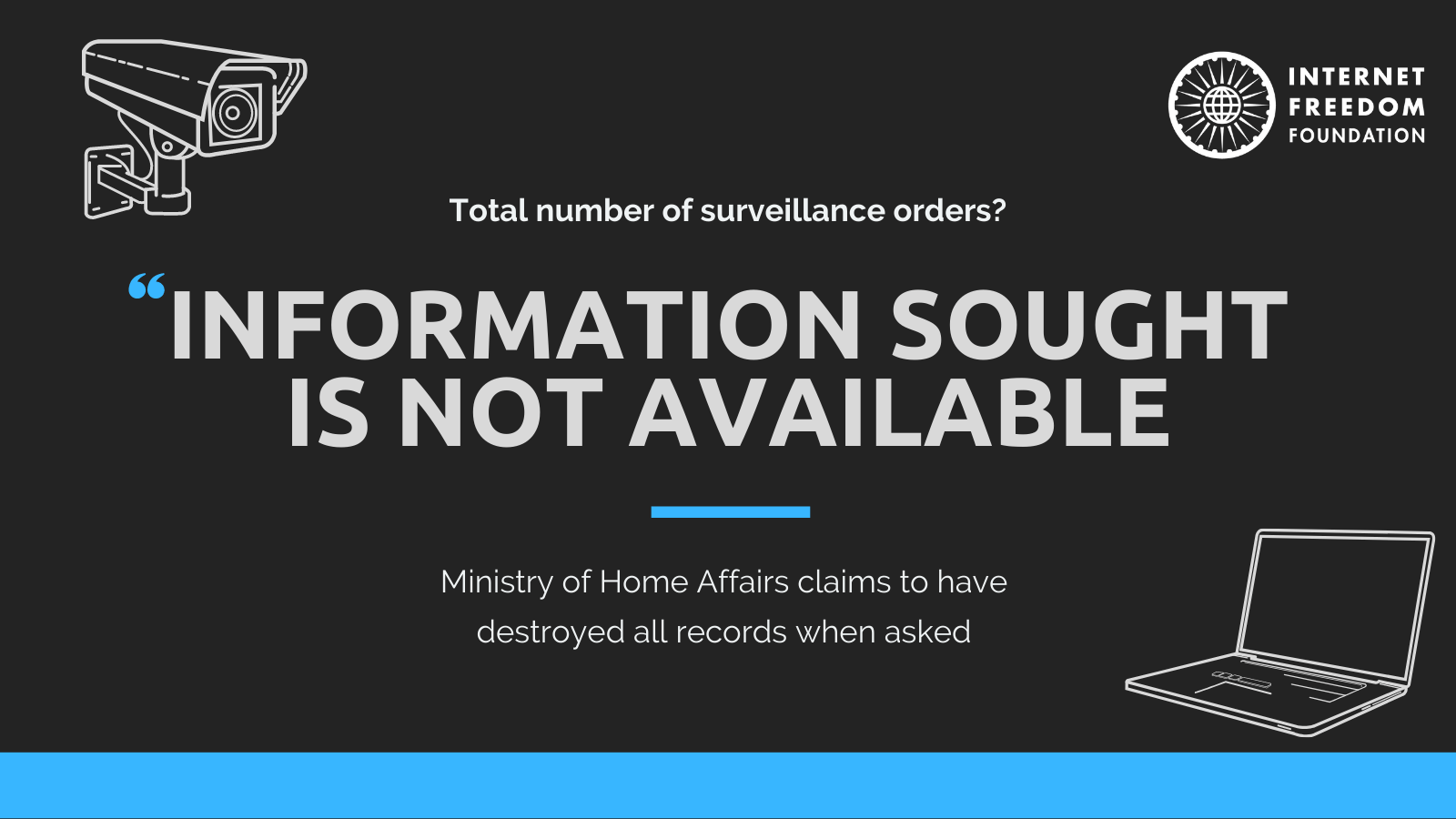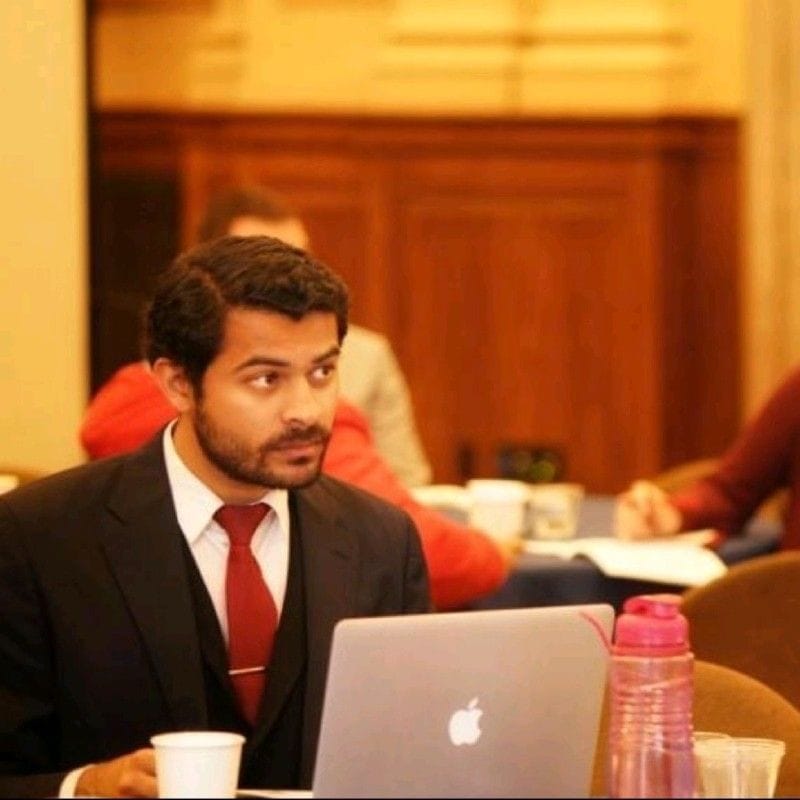
Tl;dr
IFF had filed six RTI applications with the Ministry of Home Affairs seeking data on the electronic surveillance authorised by the government. Despite initially denying the information on the grounds of national security and threat to a person’s life, the government was ordered to re-adjudicate our request for information by the Central Information Commission. Upon reconsidering the matter, the government now claims that it cannot provide the information because it simply does not have it.
Background
In December, 2018, IFF filed six RTI applications with the Central Government requesting statistical information regarding the orders for decryption or interception of digital content issued by the government agencies under section 69 of the Information Technology Act, 2000. This information is of paramount importance as it will let the public know the extent of surveillance conducted by the government. As of now, while there is a guaranteed right to privacy, the public does not even know how secure their private conversations are. This information also supports our Petition before the Supreme Court of India seeking judicial oversight into the ongoing instances of electronic surveillance. In our RTI applications, we asked the following questions:
1. Total number of surveillance orders issued by the Competent Authority.
2. Total number of surveillance requests from law enforcement agencies rejected by the Competent Authority.
3. Total number of surveillance orders issued by the Competent Authority for prevention of any offence affecting the sovereignty or integrity, defense, or security of the State.
4. Total number of surveillance orders issued by the Competent Authority for investigation of any offence.
5. Total number of orders which authorize surveillance for more than 15 days.
6. Total number of surveillance orders which were renewed for a period exceeding 60 days.
No data was provided - only excuses
Despite merely seeking information on data related to electronic surveillance which is well within the purview of the rights guaranteed by the Right to Information Act, 2005, we were refused the grant of this information by the Chief Public Information Officer of the Ministry of Home Affairs. The refusal was initially based on Section 8 (1) (a) which prejudicially affects national security, section 8(1)(h) which endanger the life and safety of any person and section 8(1)(h) which interfere with ongoing investigations. The Ministry did not explain how any of these exemptions were attracted by statistical, aggregate, anonymous numbers. No personally identifiable information such as name, phone number etc. was sought. IFF did not ask “Who was surveilled?”, but merely “How many were surveilled?”. Clearly, the information sought did not fall under any of the above mentioned categories.
Further, there is a precedent of disclosing such statistical information to RTI applicants by the Ministry itself. Aggrieved by such a reply, we preferred a first appeal before the First Appellate Authority, arguing that the reply of the CPIO was illegal. The First Appellate Authority upheld the reply of the CPIO without any due consideration.
We then approached the Central Information Commission (CIC) with an appeal against the decision of the Ministry and on May 17, 2021, the CIC heard our appeal. The CIC accepted our contention that none of the exemptions under the RTI Act were validly invoked, and that there was no legal reason for the Ministry to deny our request for information, and ordered the Ministry to re-adjudicate the matter. Accordingly the First Appellate Authority within the Ministry conducted a telephonic hearing on June 24, 2021 and provided us with a revised order on August 3, 2021.
Once again, more excuses from the Ministry
The First Appellate Authority within the Ministry this time provided a different excuse for not providing us the information - that it doesn’t exist anymore. The Ministry relied on Rule 23 of the Information Technology (Procedure and Safeguards for Interception, Monitoring and Decryption of Information) Rules, 2009 (the 2009 Interception Rules), and section 419A of the Indian Telegraph Act and said that it destroys all records on surveillance every six months. The FAA further claimed that the Ministry does not record the total number of surveillance orders, and that it is not required under the RTI Act to provide information which is not maintained by the authorities.
A serious blow to transparency
It is unfortunate that the Ministry is unable to produce the records which have serious ramifications upon the citizen’s Right to Privacy as enshrined under K.S Puttaswamy v. Union of India [(2017) 10 SCC 1. Rule 23 of the 2009 Interception Rules does not, and cannot, apply to aggregated data relating to total extent of surveillance. Rule 23 is limited only to the individual surveillance order and any communications stored with the security agency or intermediary which facilitated the interception. Further, this must be destroyed by security agencies such as NIA or RAW, and not the MHA for reasons related to confidentiality, which have nothing at all to do with statistics. The Ministry, in its reply also failed to consider Rule 23(2) which necessitates the retention of the records for the “purposes of any ongoing investigation, criminal complaint or legal proceedings”. The RTI Applications were filed on December 28, 2018, and thus there was no occasion for the security agency to destroy records. Such indiscrete removal of records through an erroneous interpretation of the 2009 Interception Rules, is prima facie mala fide.
It further sets an adverse precedent of arbitrarily denying access to information regarding surveillance as can be gleaned in the Ministry’s reply dated August 5, 2021 to the Parliamentary Question raised by Rajya Sabha MP, John Brittas. Destruction of such information is not only illegal but also disables our right to receive information.
We further highlight the unnecessary delay caused by the Ministry in its earlier replies by relying on unrelated provisions of the RTI Act, 2005. This appears to be a dilatory tactic and a glaring instance where the non-application of mind by the First Appellate Authority in the first instance has led to the purported loss of vital information which had integral elements of public interest in it. The MHA’s reliance on a provision which purportedly requires the MHA to destroy records after a certain amount of time, in a matter where the MHA has caused significant delays, is particularly self-serving.
IFF shall persist in its quest for seeking transparency and accountability from the government.
Important Documents
- CIC order in Apar v. CPIO, MHA dated May 17, 2021 (link)
- Reply of the First Appellate Authority, MHA dated August 3, 2021 (link)
- Parliamentary Question on Telephone Interception dated August 5, 2021 (link)
- Previous blogpost, "IFF keeps pushing against secrecy in surveillance. CIC orders MHA to adjudicate on our request for transparency", dated May 19, 2021 (link)

